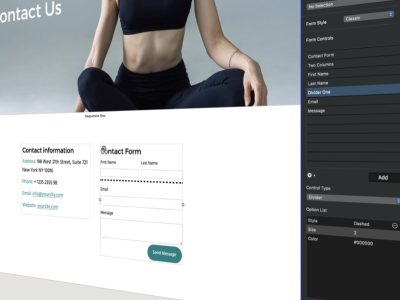When you build your website with EverWeb there are many things that you will need to consider. Here are some suggestions to help you make sure that you have a fully featured website that serves both yourself, your business and your clients, customers or visitors!
- Remember Your SEO!:The first tip is that you should always pay some attention to your site’s SEO. SEO stands for Search Engine Optimization and it helps your site be as visible on the Web as possible. EverWeb takes advantage of the fields that you complete in the Page Settings tab of the Inspector Window for SEO purposes. So, make sure that you fill in the following fields on any page that you think is important for your SEO e.g. your Home Page, Sales Page, Product Information pages and so on.
- Web Page Title: This is the title that appears at the top of the search bar when you are on the page so it’s good to use. Web crawlers like it too!
- Web Page Description: This is the descriptive text that you see under the page title in the search results in your web browser. It’s good to add a short, but meaningful, text in the Web Page Description field so any potential visitor has a good idea of what the page contains if they click on the link.
- Language Field: This field is actually an SEO field and doesn’t let you change the language you want the page to be seen in. This field is used for localising your SEO to your country or region. As such it’s worth selecting if you are targeting a local country with your website. You can also set this field in the File-> Edit Publishing Settings field so you don’t have to set it on a page by page basis.
In addition, remember to include SEO in your blog posts. When creating a post, use a solid, descriptive title as this will be picked up by web brawlers. You should also add keywords and a description of the post using the Settings Cog-> Post Options… menu in the Blog Post Editor window for each blog post.
For more information on how to use SEO in your website and on using the ‘Language‘ field, check out the SEO for EverWeb video course.
- Add a 404 Page Not Found Page: Getting visitors to your site can take you both time and effort. Once your visitor has landed on your website, you’ll want to keep them there as long as you can. If your visitor hits a link or menu option which leads to a non-existent page, you could lose them if they click away from your site. Designing you own 404 Page Not Found Page is a great way to keep your visitor within your own website as you can give them choices on what to do next if they encounter non-existent pages in your site.
- Add Search Functionality to Your Site: If your site is geared towards sales or providing information, then adding Search functionality is a must. EverWeb includes the Search Field and Search Results widgets just for this purpose. Check out the EverWeb video on the Search Results widget for more information!
- Include Previous/Next Buttons: Some websites benefit from using Previous/Next buttons in each page. If this is going to be helpful for your visitors to navigate your site then include them. You can create ‘Previous’ and ‘Next’ buttons for your site then link them to Previous and Next functionality in the Hyperlinks Inspector.
- Create a Good Navigation Menu: Good navigation is essential for helping your visitors easily move around your site to find the pages they want. Make sure that your page names are short but descriptive. When using the Navigation Menu widget, make sure that the ‘Navigation Menu Display Name’ field is also short but descriptive. That’s good visually as your navigation isn’t too busy to look at and it’s also good for your SEO. Also consider using the ‘Responsive Navigation Bar’ option in the Navigation Menu widget’s Widget Settings so that on mobile devices you see a hamburger style menu instead of the regular menu.
- Add a Blog to Your Site: Blogging is a great way to expand upon subjects that you would not usually include in your main site. A blog can be useful for announcing new products, up coming events, deep dive information on products and services, reviews and so on. These are the kind of topics that help grow your website’s audience. Apart from these advantages, original content creation is good for your SEO too!
- Don’t Forget Copyright, Legal and Regulatory Info: Your site may be obliged by local regulations to state particular relevant information about your business, for example, GDPR in Europe. So remember to check with your relevant organisation if you need to add specific text or information on your website to cover you from a legal and regulatory standpoint. The other good thing to add to your site is a copyright symbol followed by the current year. You could also use a copyright symbol followed by the start year of your website up until the current year e.g. ‘20105 – 2023’. This indicates that all your content is copyrighted since the start of your site. Whilst it’s difficult to deter people from using your content, adding this to your site is a deterrent.
- Create a Smart Contact Email Address for Your Site: Your site should always have a way in which your visitors can contact you. When creating your ‘contact email’ address, try to use a name that will reduce the amount of spam emails that you can get. Using a name such as ‘info’ to prefix your email address with will get you targeted by spammers so try to be more creative. Unfortunately spam emails are a feature of online life, so reducing the amount of spam is always worthwhile!
We hope that these tips will help you build out your website so that it’s as user friendly as possible! If you have a tip that you’ve used on your site, why not share it in the Comments Section below?










Comments